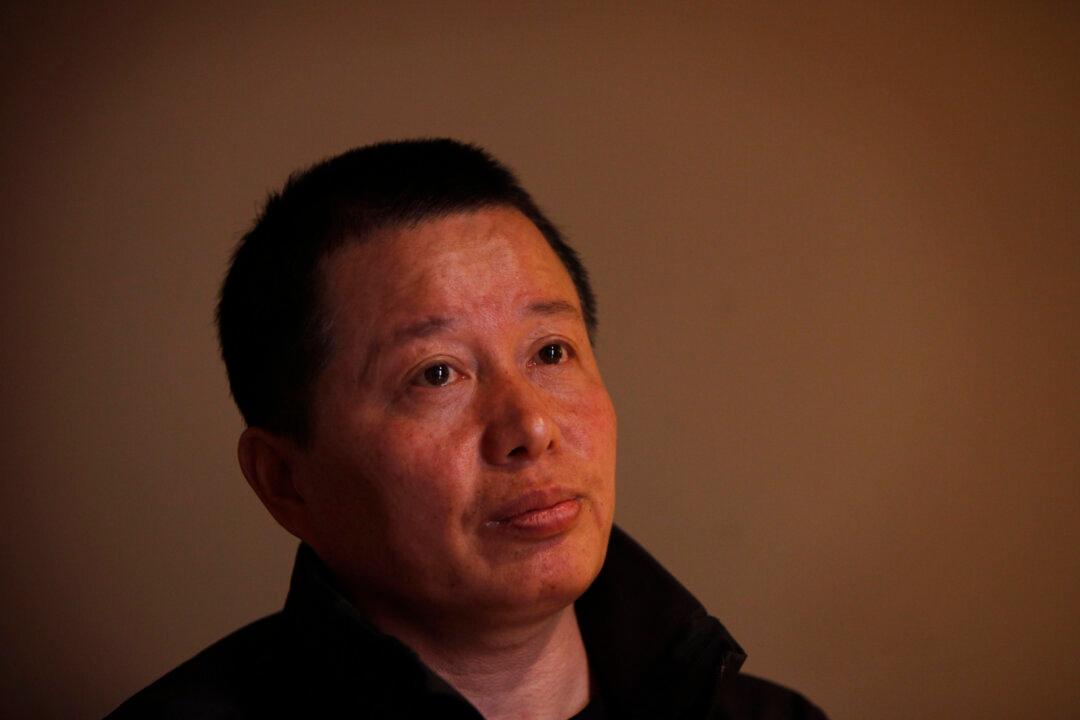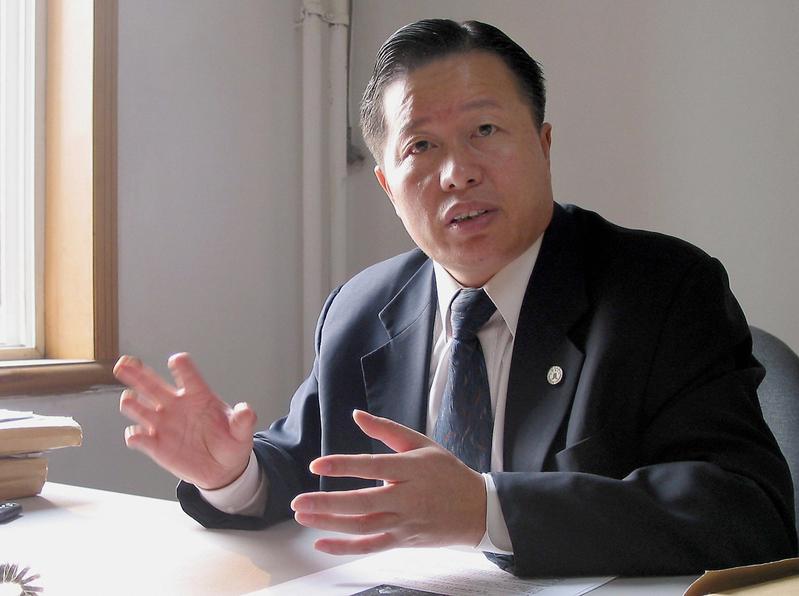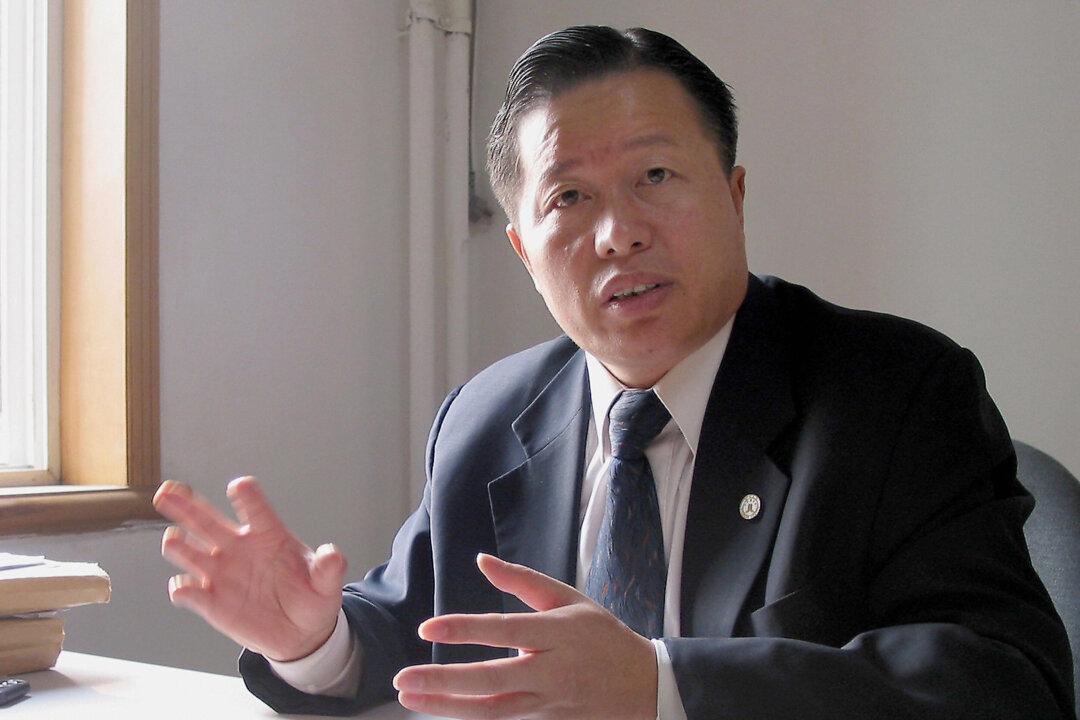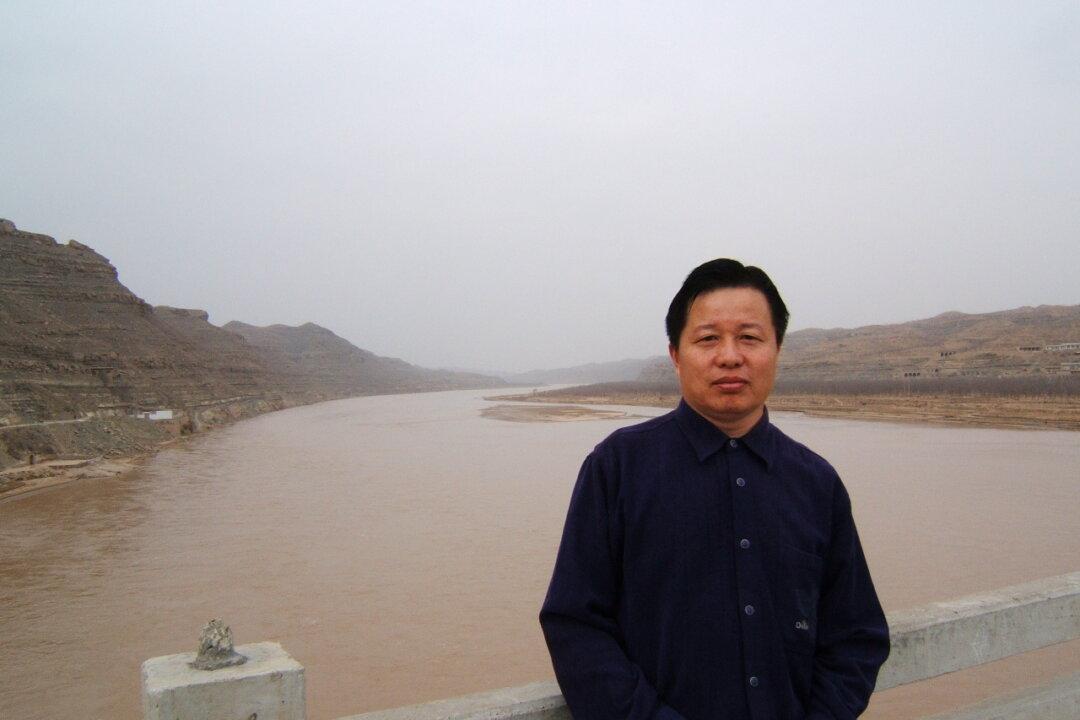To the Standing Committee of the National People’s Congress and the Committee Chairman Wu Bangguo:
As a lawyer, I have recently received from various places, many petitions and requests for help regarding the sentencing of Falun Gong practitioners and the plight [of the practitioners being punished by] re-education through labor. On December 26, my associate and I went to Shijiazhuang City of Hebei Province to offer legal assistance to Huang Wei, who has been subject to so-called re-education through labor. After taking up the case, in the course of dealing with the administrative and judicial authorities, we discovered a series of phenomena that were beyond the imagination of today’s people.
These phenomena exist in both the legislative and judicial realms. As an attornery and a citizen of the present era, I feel extraordinarily down-cast and saddened in the face of such incredible phenomena.
The first thought that came to me–after I had had negotiations with several courts in Shijiazhuang City–was that I would express such suffocating depression and sadness by submitting a letter as soon as I could to the Standing Committee of the National People’s Congress and its Chairman Wu Bangguo. I did, with only some delay as I spent time and energy trying to decide what exact form the letter should take.
In 2003, in my capacity as a citizen of the People’s Republic of China (PRC), I submitted three separate requests–each with the title “Request for Investigation into Constitution Violations”–through registered mail to the Standing Committee of the National People’s Congress.
Made on the basis of the Constitution of the PRC (hereafter Constitution) and the Legislation Law of the People’s Republic of China (hereafter Legislation Law), each of the three requests concerns one of the following issues: “Regulations Concerning the Management of Demolition and Relocation of Houses in the City,” the policy of private properties expropriated by the state for generating state income, and the obvious constitution violations by the People’s Supreme Court in interpreting the laws regarding the policy.
The three requests were met with the same outcome–no reply whatsoever. This time, after painful consideration, I have decided to write an open letter.
Huang Wei, a Shijiazhuang resident with a college education, was sent to a labor camp in 1999 for a 3-year term on the charge of “participating in evil cult activities to undermine the implementation of state laws.” Upon being released, he was only 34 years of age, but half of his hair had become grey. With hope for a good life and through incredible diligence and perseverance, he tried to run a small business and made a promising start. Although he and his family were still rather poor, they were happy and were determined to forget the bitter past and to work for a good life ahead.
On April 13, 2004, at 7:30 a.m. Huang took his child to the kindergarten as usual. As he stepped out of the kindergarten to go to work, four unidentified people abducted him. He was taken to the National Security office, where he was thoroughly searched, and all his belongings, including his bike and cash, were taken away from him. Then he was sent to a detention center.
All the way along, those who arrested him did not produce any official papers or identify themselves.
Later, local authorities got into Huang’s apartment by themselves and conducted a search. Thirty-eight days after Huang had been detained, the police, not wanting to be blamed for detaining someone longer than the law allowed, placed him in a detaining room of the Public Security office for another 15 days, during which time, again, no effort to communicate was made, except for the “questioning and reporting” by two police officers who refused to identify themselves. (When Huang asked them their names and the government department to which they belonged, their answer was, “We are interrogating you, not being interrogated by you.”) Since the report did not reflect in the least the conversation in the questioning, Huang refused to sign it. To Huang’s utter astonishment, however, one of the officers unhurriedly signed Huang’s name on the report right in front of Huang and put his fingerprint on it.
Huang later figured out that the purpose of the “questioning and reporting” was to extract evidence for sending him to the labor camp. On June 3, Huang Wei was once again given a 3-year term of re-education through labor. On June 4, leaving his “monitored life” in the detaining room, he was sent to the labor camp a second time.
Thereafter, each time Huang demanded the city government to review his case or his rights to due legal process, he had to go on hunger strike before his demand would be met. He was on hunger strike for a total of 42 days. One can imagine how sad and miserable his situation was!
In the morning of December 27, 2004, my associate and I arrived at the labor camp in Shijiazhuang City and, following the proper procedure, requested to meet with Huang Wei. The administration of the labor camp told us that they could approve requests for seeing any type of inmates except Falun Gong practitioners and that we would need special approval from the “610 Office” in order to see our client.
Braving the bitter cold weather, we went back and forth between the “610 Office” under the labor camp administration and the “610 Office” under the Judicial Bureau. It took us more than three hours to get through all the red tape; but in the end we were allowed to see our client for less than three minutes. (Those at the scene jokingly remarked that it was three hours outside the law and three minutes within the law.)
On the afternoon of December 27, the lawyers [1] took all the documents of Huang’s complaint about the fact that Shijiazhuang City government had been ignoring his case to the Intermediate Court of Shijiazhuang City. They tried to file the case “The Silence of the Shijiazhuang City government to Huang Wei’s request” but to no avail.
At 8:30 a.m. on December 28, the lawyers went to the same court with the same request and were again rejected. In a meeting with a judge at the court’s administrative chamber, the lawyers were told that the case should be brought to the court at Xinhua District.
At 9:20 a.m., the lawyers arrived at the Xinhua District Court. A judge at the administrative chamber there with the last name Miao looked through the documents and said, “There is instruction from above that no case about Falun Gong should be accepted and that no document would be issued with respect to it.”
When the lawyers pointed out to him the stipulations by relevant laws, he said the instruction came from “above” and that their job was only to implement them. He suggested the lawyers talk to the judge of the Case Filing Tribunal.
At the Case Filing Tribunal, two female staff members looked through the documents and became rather irritated. They told the lawyers that the court would neither accept cases involving Falun Gong nor issue any document with respect to it, adding that there were documents [directing they do so] from above.
The lawyers expressed that the court should base its decision about whether to accept a case or not on state laws, and that if there was a conflict between any relevant documents and the laws, then such documents would be invalid.
At this point, a young staff member at the scene burst into a near scream, “If you think the documents from above are invalid, you can ask the National People’s Congress to amend the laws.” As she finished, a judge whom she addressed as “the chamber chief” came forward saying, “You are probably not party members (referring to the lawyers) and have not studied the essentials of the Party’s National Congress, have you?
Did you know lawyers are not allowed to take cases like this? The judicial court belongs to the Chinese Communist Party, so do the laws. Now there are instructions from above not to accept [such cases,] that’s it. You may talk to whomever you want to and file your case wherever you want."
After that, there was no explanation from anyone anymore.
Asked by the lawyers, another judge said the case should be brought to the court of the Chang'an District. At 10:30 a.m., the lawyers arrived at the third court [that day] and were, again, received by a judge from the administrative chamber.
As soon as the lawyers said the case involved Falun Gong, the judge immediately returned the documents that he was reading to the lawyers and told the same story: the instructions from above stipulate that no Falun Gong cases would be considered, no documents would be issued regarding them, and no document justifying [the way it is handled] would be produced.
The judge added, “What you lawyers are doing is very risky. If you continue with this, it will be necessary to write a judicial report (demanding disciplinary actions against you.)” That concluded the lawyers’ efforts to file a case at three courts involving two levels in Shijiazhuang City.
In handling the case of Huang Wei being sent to a labor camp, I found the following phenomena, which are at odds with the civilization of modern society as well as the rule of law that is advocated, implemented, and sought after by the public. These phenomena are much more prominent in the judicial realm, to such an extent that one feels horrified and in a hopeless situation. As a lawyer and a Chinese, I cannot choose to be silent!
From the perspective of the existing laws, the sentence and punishment of Falun Gong practitioners completely violates the basic legal principles and modern practices of the rule of law:
1. In any country that adopts statute law, the applicability of criminal law naturally circumscribes the time frame and the extent to which the regulation of the criminal laws can be applied (including the issue of people, events, and location).
Theoretically, the “Criminal Law of the People’s Republic of China” (hereafter as “Criminal Law”) is no exception. It is a basic principle of our country’s “Criminal Law” that its rules do not apply to the past, that is, the “Criminal Law” does not apply to behaviors that took place prior to the legislation of the “Criminal Law.” On October 30, 1999, the promulgation by the Standing Committee of the National People’s Congress of a “Decision to Eradicate Evil Cult Organizations and to Prevent and Punish Evil Cult Activities” (hereafter as “Decision”) served only a matter of formality, making up something that is needed in the legislation of criminal punishment [regarding the said activities].
And thereafter, the majority of the criminal punishment of citizens who practice Falun Gong was directed toward their behavior prior to the promulgation of the “Decision.” The sentencing of Huang Wei to re-education through labor in November of 1999 belongs squarely to this situation.
This violation of basic principles of our country’s “Criminal Law” has been public, sustained, and large scale. That is to say, the majority of the citizens have been thrown into prison in a situation where our country’s basic legal principles are violated.
2. Whether a country adopts statute law or common law, criminal law can only regulate (or “attack,” a word commonly used in our country) people’s action, but not the thoughts or identity of a certain group of people.
This is a result of the coming of age of criminal laws around the world.
The punishing of many citizens who practice Falun Gong has been due to their identity as Falun Gong practitioners; Huang Wei being sent to a labor camp is a clear example. This is a revolt against modern civilization and the rule of law. Its direct result is rendering universal legal standards arbitrary, causing substantial long term damage to the rule of law that has been affirmed and pursued by our country.
3. The “Decision” has not offered any legal definitions for proper judgments in trials regarding: Falun Gong practitioners; the behavior of Falun Gong practitioners; the relationship between Falun Gong practitioners and Falun Gong as an organization; the relationship between the Falun Gong organization and so called “evil cult organizations; what an evil cult organization is; and in what ways Falun Gong practitioners, the behavior of Falun Gong practitioners, and the Falun Gong organization belong to the category of evil cult crimes.
As a result, the majority of the sentencing and punishment of Falun Gong practitioners are based on “using evil cult organizations to obstruct the exercising of state laws.”
And in the criminal charges, there is a lack of the necessary information about whether there is indeed any evil cult organization that could be used by the person charged with the crimes; whether the person did make use of any evil cult organization; when and where the person charged made use of an evil cult organization; whether the person charged did obstruct the exercising of state laws; and how the person obstructed the state laws. In the two times where Huang Wei was punished (even though [the reason offered] was for administrative purposes–[since no trial was involved]), the reason was simply for “using evil cult organizations to obstruct the exercising of state laws.” In this situation, there is no guarantee whatsoever that the criminal punishment is based on concrete evidence and is accurate, leaving the citizens in a dangerous situation without any protection.
4. The arbitrary sentencing of Falun Gong practitioners to labor camps in some places has reached a painful level, and the reasons used include “refusal to reform” or “refusal to convert.” (As I write this letter, a woman from Wuhan, Ms. Du Wenli, who just gave birth to a child three months ago, sent a fax to me, describing in desperation her husband Ni Guobin’s frightening experience.
Ni was released after a three-year imprisonment, but on July 13 of this year, he was kidnapped on his way to work by some people whose identities were undisclosed. Ten days later, he was sent back with only one breath left. Queried by the 110 policemen, the kidnappers revealed that they were from the State Security Bureau. On December 3, Ni was kidnapped again, and to this day Du has no information about the whereabouts of her husband.)
What should be pointed out here in particular is that the very existence of labor camps and their sentencing practices have clearly violated Articles 5, 22, 37, and 38 of the “Constitution,” Article 10 of “The Law of the People’s Republic of China on Administrative Punishment” (which states that administrative laws can issue administrative punishments other than the confinement of personal freedom), and Article 8 of the “Legislative Law.”
A citizen’s personal freedom is deprived for years, and the deprived is not given any procedures for appeal, defense, or trial. The person is sent to labor camps after receiving a sentencing decision. This is unthinkable in a lawful, civilized society. With freedom deprived, all channels of assistance that the victim is entitled to have become hypothetical. While in the labor camp, Huang Wei could not make any appeal. Every step in making an appeal had to be paid with the painful cost of many days on hunger strike.
All citizens, including policemen, know that the labor camp system violates the constitution, basic laws, and modern legal civilization, but the system has continued, and the country is paying a higher and higher cost for this inhuman and uncivilized behavior. I ask the Standing Committee of the National People’s Congress and its chairman Wu Bangguo to please pay attention to this issue.
5. The conspiratorial promulgation of these detrimental phenomena on the part of the country and its local governments have directly led to the vicious behavior of legal workers. In Huang Wei’s case, the legal workers’ irresponsibility and their corrupt, un-professional conduct have reached an alarming level despised by any civilized society. More terrifying is that they did not consider their behavior shameful.
Judges and courts of justice are guardians of legal values, and their professional code of ethics, expert knowledge, and civilized systems should function to raise their instinctual caution over possible deviations from legal values.
This is a universal value standard of judges and courts of justice in all of humankind’s civilized societies. But in Huang Wei’s case, what we see is just the opposite. The judges and the courts of justice, while paying the role of “gate keepers,” have not any sense of responsibility and morality in their treatment of state laws and legal principles. They attack, like dogs, anyone who attempts to uphold legal values.
They have no respect for the sacredness of their profession, and are doing all they can to generate negative moral and social effects in the state’s exercise of power. This really pains me (I assume Chairman Wu Bangguo must feel the same.)
As I began to write this letter, others warned me out of kindness that the Falun Gong issue is taboo and a “political issue.” As a lawyer, I am well aware of the special social situation in China. In a society where political powers are used appropriately, there would be no taboos.
The fact that taboos exist demonstrates distortion, illegitimacy and dishonesty in the usage of political power. On the other hand, why aren’t citizens allowed to comment on political issues? Whose politics is it if it can’t be discussed? Politics that can’t be discussed must be illegitimate.
When a society is left with only one voice, what kind of a situation will it become? Emperor Zhu Yuanzhang’s era of the Ming Dynasty was too long ago.
More recent examples are the Cultural Revolution and the regime in North Korea, one of the “axis’ of evil,” both had just one voice. Who wants this to proliferate?
On many international occasions, we have called ourselves a responsible, large nation. No criterion for a responsible, large nation is more honest and valuable than acceptance from its own people. The fact that the government is afraid of citizens’ reporting their survival problems shows how far we are from being a responsible, large nation.
In summary, writing this letter to the Standing Committee of the People’s Congress and chairman Wu Bangguo of the Standing Committee is not to advocate for a certain group of people, nor is it to “sing a tune opposite of the CCP and the government.”
I love my nation.
It is the only thing that inspires me in this era. At the same time, writing this letter is not just trying to change the unjust treatment that Huang Wei received. The most important goal for my letter is, with effort by the Standing Committee of the People’s Congress and chairman Wu, to try to change the distortion in the current legislation and law enforcement processes through systematic changes. At the beginning of the human civilization, there were great differences between the cultures of each region.
However, all the great civilizations, without communicating with each other, chose to invent written languages and establish common rules. In other words, following the rule of law is a methodical choice made by all human civilizations.
In today’s world, the nations that are against the rule of law are closed, underdeveloped, unstable, and savage. Every citizen’s longing and passion for social stability are no less than that of the governing body. The lack of following the rule of law, disguised under the slogan “Stability trumps all,” is the greatest source of instability in Chinese society today.
On the issue of Falun Gong, the government, especially those who implement the law, should first admit the practitioners’ status as Chinese citizens. On the other hand, on this issue, the government and law enforcement officials must recognize that they represent the nation, and must follow the law in all their actions.
If they act outside the boundaries of the law, whose power are they representing? For example, the court did not establish a case, follow any legal procedure, or allow a lawyer to represent the plaintiff in the case of Huang Wei.
Even today, his wife and child are denied visits to see him. These are blatant, unconcealed actions in violation of the rules. What’s even worse is that those who act against the rules are precisely the law enforcement officials whose job it is to protect the implementation of the rules.
As time goes on, the law enforcement officials regard violation of the rules as something quite common. They no longer view protecting the rules of the nation as their professional responsibility.
Continuously, their actions are undermining and destroying morals, culture and the legitimacy of the government’s power. Whose needs are they meeting?–only the needs of the evil people who are the enemies of today’s society. We must be extremely alert on this issue!
I hereby wish Chairman Wu Bangguo good health!
Beijing Shengzhi Legal Firm
Gao Zhisheng
December 31, 2004



